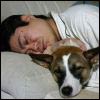
Session Overview
 |
Along with what to buy, another key decision that we make every day as economic agents is how much to work and how much to relax. The decision about supplying labor can be analyzed with the same tools used to analyze the market for pizza or movies, and we call this the analysis of the labor market. This lecture provides an overview of the economics of the labor market. The decision to nap instead of work can be analyzed by economic tools. Image courtesy of Joi Ito on Flickr. |
Keywords: Labor supply; Giffin good; leisure; consumer theory; labor economics; child labor.
Session Activities
Readings
Before watching the lecture video, read the course textbook for an introduction to the material covered in this session:
- [R&T] Chapter 7, "The Analysis of Consumer Choice." Sections 7.2.
- [R&T] Chapter 12, "Wages and Employment in Perfect Competition."
- [Perloff] Chapter 5, "Applying Consumer Theory." (optional)
Lecture Videos
The lecture video for this session consists of two parts.
View Full Video
View by Chapter
- Review: Income and Substitution Effects (00:10:10)
- The Labor-Leisure Tradeoff (00:07:33)
- Impact of Wage Changes on Labor-Leisure Tradeoff (00:08:43)
- Determinants of Labor Supply: Change in Consumption (00:14:15)
- Impact of Labor Supply on Unemployment (00:09:38)
Resources
View Full Video
Resources
Check Yourself
Concept Quiz
This concept quiz covers key vocabulary terms and also tests your intuitive understanding of the material covered in this session. Complete this quiz before moving on to the next session to make sure you understand the concepts required to solve the mathematical and graphical problems that are the basis of this course.
Further Study
These optional resources are provided for students that wish to explore this topic more fully.
Textbook Study Materials
See the [Perloff] chapter for the topics covered, as well as quizzes, applications, and other related resources.
Other OCW and OER Content
| CONTENT | PROVIDER | NOTES |
|---|---|---|
| 14.64 Labor Economics and Public Policy, Fall 2009. | MIT OpenCourseWare | An in-depth course on labor economics. |
